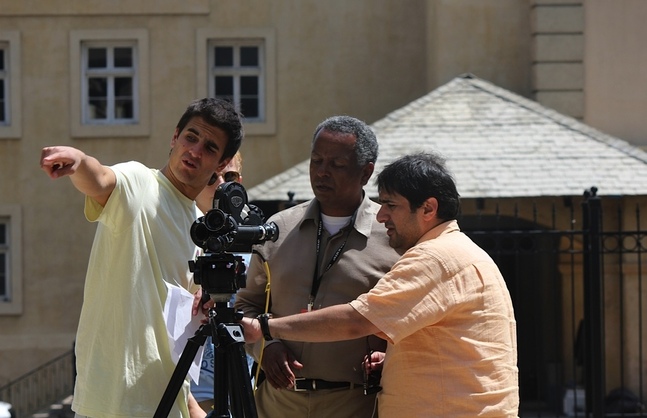 Screen shot from Mel Tewahade's documentary "Point Four." (Photo courtesy of Mel Tewahade)
Screen shot from Mel Tewahade's documentary "Point Four." (Photo courtesy of Mel Tewahade)
Tadias Magazine
By Tadias Staff | Events News
Published: Monday, September 17, 2012
Washington, D.C. (TADIAS) – Today with large sums of assistance flowing from the United States into Ethiopia, worth $6.226 billion in the last decade alone including $847 million in fiscal year 2011, the country is considered one of America’s closest strategic allies in Africa and one of the biggest recipients of U.S. aid on the continent.
According to Denver-based businessman and filmmaker Mel Tewahade, producer of the documentary Point Four (scheduled to be screened in Washington, D.C. this week to employees of USAID), the formal relationship between the United States and Ethiopia dates back more than a century, but did not start in earnest until President Truman’s “Point Four Program” in the late 1940s and early 1950s.
In a recent interview with TADIAS Mel said Point Four was eventually replaced by the current United States Agency for International Development (USAID), which now funds and oversees several civilian projects in Ethiopia covering economic development and humanitarian initiatives.
“It is very important for the current generation of USAID public servants to understand the genesis of the U.S. effort in developing world,” Mel said. “Point Four, a technical assistance program for developing countries that was announced by President Harry Truman during his inaugural speech on January 20th, 1949, was the predecessor to USAID.”
Mel’s movie highlights the role of Truman’s policy in establishing agricultural and educational institutions in Ethiopia, while exploring the contribution of American teachers, particularly the staff from Oklahoma State University (OSU).
“Larger-scale US-Ethiopian collaborations started with the Point Four Program in 1952, when Americans helped establish the first agricultural high school in Jimma, known as the Jimma Agricultural and Technical School (JATS), where all faculty were recruited from Oklahoma State University,” Mel said. “Shortly afterwards, it was followed by the establishment of the Harar and Debre Brehan Teacher Training Institutes. Alemaya Agricultural College opened its doors in 1954.”
Mel said the U.S. program also assisted in setting up the Ethiopian Highway Authority and Malaria Control Agency.
USAID still funds many programs there, including projects related to population control, tuberculosis prevention, family planning, reproductive health, newborn care, water sanitation, primary education, teacher training, scholarship for young girls, and strengthening good governance.
“My feelings for Ethiopian and American collaboration and the respect that I have for pioneering Americans and countless Ethiopian public servants along with diligent Ethiopian students who benefited from these efforts are worth preserving,” Mel said. “The contrast between my expectations and the reality I encountered through my research for this film was profound. The Oklahoma educators, the cultured and optimist Ethiopians and their work ethic and love of country is remarkable, as is respect for American teachers and Ethiopian students, pursuing a formal education against incredible odds. I hope my documentary shares this, and I hope it will spark positive cross-cultural dialogue and help us embrace our shared humanity.”
Mel said his other new film Peace Corps in Ethiopia will also be released in Addis Ababa next week (September 25). “My talented film crew will travel with me to make a documentary film of the event itself,” he said, pointing out that on September 24, over 100 Americans who served as Peace Corps Volunteers will arrive in Addis Ababa for a two week visit to commemorate the arrival of the first Peace Corps group 50 years ago.
As to Point Four, Mel said the audience’s reaction so far has been mostly supportive. “I have traveled to Stillwater, Oklahoma (OSU), Tulsa, Toronto, Washington, D.C., Denver, Los Angeles, and Seattle” he said. “The response from the public has been positive. People in Oklahoma were in tears as they already had a connection to the story.”
“On the negative side, in Denver, an American commented that he could not believe that U.S. helped anyone, and in particular Ethiopia, that did not have a drop of oil,” Mel said. “Another Ethiopian in Toronto accused me of exaggerating the achievement of white people in Ethiopia.” Overall Mel has mostly received a warm reception as he travels with his film.
Regarding the screening on Wednesday he noted that there is limited seating for only 60 people. “It will be shown mainly to USAID employees,” he said. “But I welcome members of our community to join me. We will accommodate people on a first come, first serve basis.”

Mel Tewahade (center) working on his documentary “Point Four.” (Courtesy photo)
—
If you go:
D.C. Screening of Point Four
September 19,2012 at 6.30 PM
1250 Eye Street, NW Suite 1100,
Washington, DC 20005
Click here to learn more about the film.

























